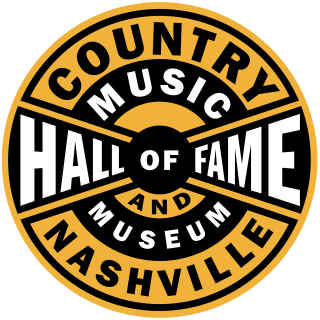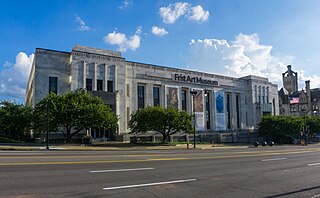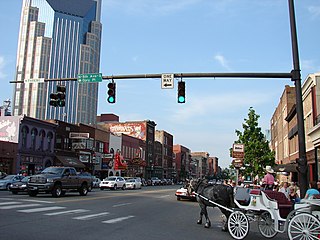Related Research Articles

Nashville is the capital and most populous city of the U.S. state of Tennessee, as well as the seat of Davidson County. With a population of 689,447 at the 2020 U.S. census, Nashville is the 21st most-populous city in the United States, and the fourth most populous city in the southeastern U.S. Located on the Cumberland River, the city is the center of the Nashville metropolitan area, and is one of the fastest growing in the nation.

The Grand Ole Opry is an American weekly live country music radio broadcast from – and a several nights per week performance held at – the Opry House in Nashville, Tennessee. It was founded on November 28, 1925, by George D. Hay as a one-hour radio "barn dance" on WSM. Currently owned and operated by Opry Entertainment, it is the longest-running radio broadcast in U.S. history. Dedicated to honoring country music and its history, the Opry showcases a mix of famous singers and contemporary chart-toppers performing country, bluegrass, Americana, folk, and gospel music as well as comedic performances and skits. It attracts hundreds of thousands of visitors from around the world and millions of radio and internet listeners.

The Country Music Hall of Fame and Museum in Nashville, Tennessee, is one of the world's largest museums and research centers dedicated to the preservation and interpretation of American vernacular music. Chartered in 1964, the museum has amassed one of the world's most extensive musical collections.
The story of Tennessee's contribution to American music is essentially the story of three cities: Nashville, Memphis, and Bristol. While Nashville is most famous for its status as the long-time capital of country music, Bristol is recognized as the "Birthplace of Country Music". Memphis musicians have had an enormous influence on blues, early rock and roll, R&B, and soul music, as well as an increasing presence in rap.

Ryman Auditorium is a historic 2,362-seat live-performance venue located at 116 Rep. John Lewis Way North, in the downtown core of Nashville, Tennessee, United States. A Rock & Roll Hall of Fame Landmark, National Historic Landmark, and the former home of the Grand Ole Opry, it is one of the most influential and revered concert halls in the world. It is best known as the home of the Grand Ole Opry from 1943 to 1974. It is owned and operated by Ryman Hospitality Properties, Inc. Ryman Auditorium was listed on the National Register of Historic Places in 1971 and was later designated as a National Historic Landmark on June 25, 2001, for its pivotal role in the popularization of country music. A storied stage for Rock & Roll artists for decades, the Ryman was named a Rock & Roll Hall of Fame Landmark in 2022.
S. H. Kress & Co. was the trading name of a chain of five and dime retail department stores in the United States established by Samuel Henry Kress. It operated from 1896 to 1981. In the first half of the 20th century, there were Kress stores with ornamented architecture in hundreds of cities and towns.

The Nashville Zoo at Grassmere is a zoological garden and historic plantation farmhouse located 6 miles (9.7 km) southeast of Downtown Nashville. As of 2014, the zoo was middle Tennessee's top paid attraction and contained 6,230 individual animals, encompassing 339 species. The zoo's site is approximately 188 acres (76 ha) in size. It is an accredited member of the Association of Zoos and Aquariums.

The Frist Art Museum, formerly known as the Frist Center for the Visual Arts, is an art exhibition hall in Nashville, Tennessee, housed in the city's historic U.S. Post Office building, which is listed on the National Register of Historic Places.

Music Row is a historic district located southwest of downtown Nashville, Tennessee, United States. Widely considered the heart of Nashville's entertainment industry, Music Row has also become a metonymous nickname for the music industry as a whole, particularly in country music, gospel music, and contemporary Christian music.

RCA Studio B was a music recording studio built in 1956 in Nashville, Tennessee by RCA Victor. Originally known simply as "RCA Studios," Studio B, along with the larger and later RCA Studio A became known in the 1960s for being an essential factor to the development of the musical production style and sound engineering technique known as the Nashville Sound. In the two decades the studio was in operation, RCA Studio B produced 60 percent of the Billboard magazine's Country chart hits. The studio closed in 1977.
William Owen Bradley was an American musician, bandleader and record producer who, along with Chet Atkins, Bob Ferguson, Bill Porter, and Don Law, was one of the chief architects of the 1950s and 1960s Nashville sound in country music and rockabilly.
Paul Cohen was an American country music producer.

Broadway is a major thoroughfare in the downtown area in Nashville, Tennessee. It includes Lower Broadway, an entertainment district renowned for honky tonks and live country music.
Acuff-Rose Music, Inc. was an American music publishing firm formed in 1942 by Roy Acuff and Fred Rose in Nashville, Tennessee, United States. Currently, the company's catalog is owned by Sony Music Publishing (US), LLC (Delaware).
Robert Karl Oermann is a Nashville-based music journalist and author who is recognized as an authority on country music. Oermann is a long-time regular contributor to the trade publication MusicRow, for which he writes a weekly column.

The Musicians Hall of Fame and Museum (MHOF) in Nashville honors all musicians regardless of genre or instrument. The MHOF timeline starts with the beginning of recorded music and inductees are nominated by current members of the American Federation of Musicians and by other music industry professionals.
The following is a timeline of the history of the city of Nashville, Tennessee, United States.

The Johnny Cash Museum opened in May 2013 in Nashville, Tennessee, to honor the life and music of the country superstar often referred to as the "Man in Black." It houses the world's largest collection of Johnny Cash memorabilia and artifacts, including a stone wall taken from his lake house in Hendersonville, Tennessee, and is officially authorized by Cash's estate.
Jerry Owen Bradley was an American music executive known for his role in country music. As head of RCA Records in Nashville from 1973 to 1982, Bradley was involved in the marketing and creation of the first platinum album in country music, Wanted! The Outlaws, which reached that mark in 1976. Bradley was inducted in the Country Music Hall of Fame in 2019.
Roy Horton was an American music executive known for over forty year role with Peer-Southern Music. Though based in New York City, Horton was a founding member of both the Country Music Association (CMA) and the Country Music Foundation. It was while he was CMA chairman in March 1967, Horton participated in the opening of the first Country Music Hall of Fame and Museum on Music Row in Nashville. Horton was himself inducted into the Hall of Fame in 1982.
References
- 1 2 John Rumble, "Country Music Foundation," Tennessee Encyclopedia of History and Culture.
- ↑ Guidestar, Country Music Foundation, Mission
- ↑ "Country Music Hall of Fame, Introduction to the Museum". Archived from the original on 2011-01-22. Retrieved 2011-02-01.